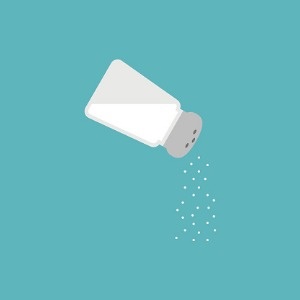
Salt has long been labelled a hypertension villain, but the link between the two isn’t so clear-cut, a new study finds.
The recommended daily sodium intake is 2 300 mg. This is equal to about five grams (one teaspoon) of salt per day. However, findings from a 16-year study call this guideline into question.
Lynn L. Moore, an associate professor of medicine at Boston University School of Medicine in Massachusetts, and her team analysed data from more than 2 000 men and women between the ages of 30 and 64 years old.
At the start of the study, all the participants had normal blood pressure. But as the trial went on, the researchers found that participants who took in less than 2 500 mg of sodium a day had higher blood pressure than those who had higher amounts of sodium.
Even though the results seem counter intuitive, they support the belief that there’s a relationship between sodium and cardiovascular risk. This means that both low-sodium and very high-sodium diets carry a higher risk for heart disease.
“We saw no evidence that diets lower in sodium had any long-term beneficial effects on blood pressure,” says Professor Moore. “Our findings add to growing evidence that current recommendations for sodium intake may be misguided."
Potassium power
Sodium isn’t the only dietary factor in blood pressure. The study also underlines the importance of potassium.
The researchers found that people with the lowest blood pressure had the highest intake of sodium and potassium, and those with the highest blood pressure had the lowest intake of sodium and potassium.
Similar effects were seen with magnesium and calcium; higher levels were linked to lower blood pressure, and vice versa.
With this study, Moore hopes to play a part in shifting dietary decisions, and refocus “on the importance of increasing intakes of foods rich in potassium, calcium, and magnesium for the purpose of maintaining a healthy blood pressure."
Sugar worse than salt
Nevermind salt; research suggests that sugar has a bigger impact on blood pressure. According to findings published in Open Heart, sugar may be more strongly and directly linked to hypertension and the risk of developing cardiovascular problems.
The study found that:
- A high sugar intake increases systolic blood pressure.
- People who consume 10-25% of their calories from added sugars have a 30% increased risk of death from cardiovascular disease.
- Those who consume 25% or more of their calories from sugar face an almost threefold risk.
- Table sugar is made up of glucose and fructose. A high-fructose diet for just two weeks increases systolic blood pressure and diastolic blood pressure. Excessive fructose also raises heart rate, triglycerides (bad fats in the blood), and cholesterol levels.
This doesn’t mean that salt is off the hook. - Too much salt can still cause your body to hold onto extra water, and increase the volume of blood in your arteries. This can cause your small arteries to constrict and restrict blood flow, resulting in high blood pressure.
Control the pressure
Other than watching your salt and sugar intake:
- Eat at least five portions of fruits and vegetables daily. A diet high in whole fruits and veg has been shown to lower blood pressure.
- Use herbs and spices to season your food. In doing so, you won’t need to use as much sugar and salt to make your food taste delicious.
- Exercise for at least 30 minutes every day. Being more active can lower your systolic blood pressure by an average of 4 to 9 mm Hg. That's as good as some blood pressure medications.





 Publications
Publications
 Partners
Partners










